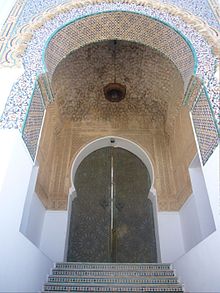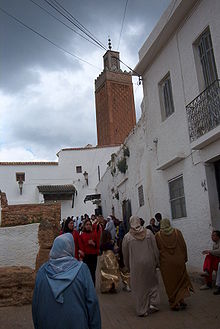Sidi Abu Madyan أبو مدين | |
|---|---|
 Entrance of Sidi Boumediene Mosque in Tlemcen | |
| Title | al-Ghawth (The succour) الغوث |
| Personal | |
| Born | Shu'ayb ibn al-Hussein شعيب أبو مدين 1126 |
| Died | 1198 near the river of Ysser, outskirts of Tlemcen, Almohad empire |
| Resting place | Sidi Boumediene Mausoleum |
| Religion | Islam |
| Denomination | Sunni |
| Jurisprudence | Maliki |
| Creed | Ash'ari |
| Notable work(s) | Bidayt al-Muridin (بداية المريدين) Uns al-Wahid (أنس الوحيد) Tuhfat al-Arib (تحفة الأريب) poetry collection |
| Alma mater | Córdoba al-Qarawiyyin Béjaïa |
| Tariqa | Qadiriyya |
| Muslim leader | |
| Disciple of | Sidi Harazem |
Influenced by | |


Abu Madyan Shuʿayb ibn al-Husayn al-Ansari al-Andalusi (Arabic: ابو مدين شعيب بن الحسين الأنصاري الأندلسي; c. 1126 – 1198 CE), commonly known as Abū Madyan, was an influential Andalusian mystic and a great Sufi master.
Some even refer to him as the national figure of Maghreb mysticism as he was such a forerunner of Sufism in this geographical area. Devoted to the fervent service of God, he helped introduce looking into oneself and harmonizing internal occurrences with the external observances through asceticism.[1]
Among his most famous students were Ibn 'Arabi (d. 637/1240) and the historian Ibn Hammad (d. 628/1230).[2][3]
- ^ "Sidi Boumediene Chouaib, pôle du soufisme au Maghreb: Un nom lié à la ville ancestrale" ["Sidi Boumediene Chouaib, center of Sufism in the Maghreb: A name linked to the ancient city"] Archived 2019-04-14 at the Wayback Machine (in French). El Moudjahid (Algiers). 16 April 2011.
- ^ Ahmad Farid al-Mazidi (2010). شيخ الشيوخ في الأمصار أبو مدين الغوث (in Arabic). Lebanon: Dar al-Kutub al-'Ilmiyya. p. 150. ISBN 9782745168269 – via Google Books.
- ^ Hifnawi Ba'li (2018). الرحلات الحجازية المغاربية: المغاربة الأعلام في البلد الحرام (in Arabic). Jordan: Yazouri Group for Publication and Distribution. p. 302. ISBN 9789957791360 – via Google Books.
ومن تلامذة الشيخ أبو مدين شعيب، الشيخ الأكبر محي الدين بن عربي الحاتمي الطائي، وأبو عبد الله حماد الصنهاجي القلعي، والشيخ الفقيه أبو عبد الله محمد بن إبراهيم الأنصاري.